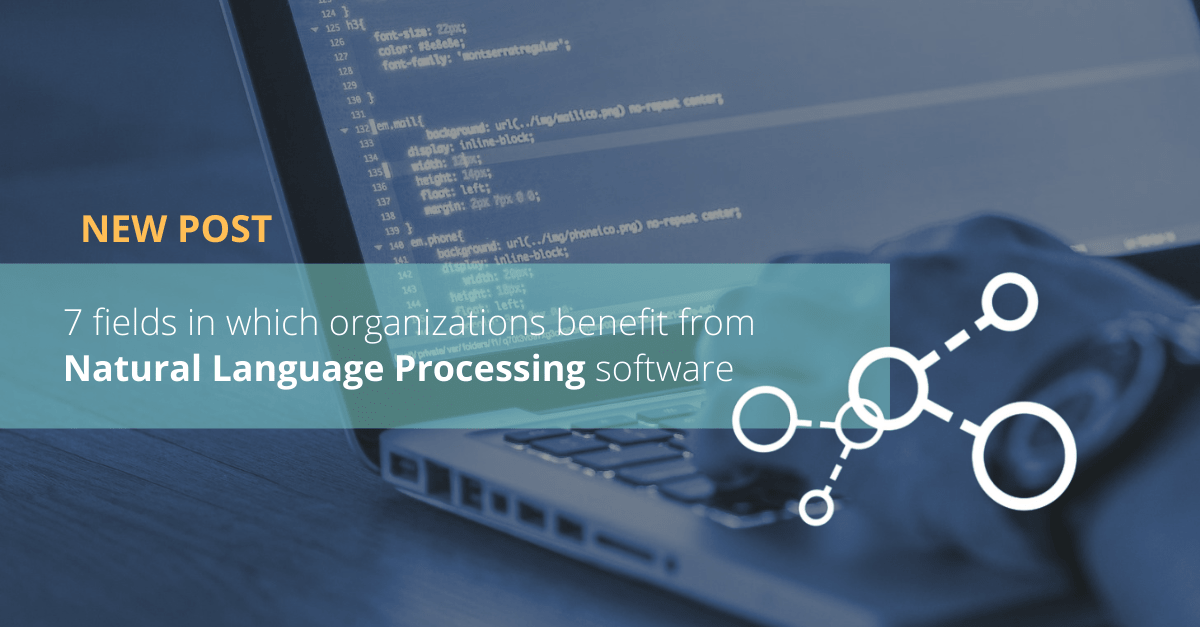Language comprises a huge body of words and sentences packed with complexities and irregularities that humans take years and years to learn. And while structured data has long been leveraged on, unstructured data is way more ambiguous and difficult to unscramble.
Application areas for decoding unstructured data including emails, text documents, videos and voice recordings, among others, keep growing exponentially. These account for nearly 80% of enterprise data today, as suggested by Accenture media source. NPL is now able to resemble human output through the use of cutting-edge technologies.
What is Natural Language Processing software?
Natural Language Processing (NLP) is a branch of artificial intelligence that enables computers and machines to understand, interpret and manipulate human language. This technique allows businesses and individuals to work with both written and spoken wording.
NLP employs a combination of computational linguistics and rule-based modeling of human language with statistical, machine learning and deep learning models. This way, Natural Language Processing software can translate text from one language to another in a matter of seconds, and in some cases, even in near real-time.
However, NLP programs go beyond language translation to create accurate digital assistants, voice-operating systems (such as GPS), speech-to-text dictation, or chatbots. Moreover, applications involve responding to spoken commands to summarizing large volumes of text in a speed-critical manner.
Benefits of Natural Language Processing
Programming solutions play a growing role in enterprise challenges, helping organizations streamline business operations, increase employee productivity and simplify strategic business processes.
The Natural Language Processing market is now estimated to reach 43 billion dollars by 2025, as stated by Avenga’s NLP article. Whether it is for enhancing customer experience in e-commerce or for offering data analysis and insight discovery, companies can gain a unique competitive advantage based on this technique that provides quality results and a whole lot of time-saving.
How can a Natural Language Processing Software help improve your business's efficiency?
Let’s take a glimpse at 7 of the most useful Natural Language Processing applications in business:
1. Machine Translation
Machine Translation (MT) is one of the main uses of NLP, being increasingly capable of understanding context and preserving the meaning of whole sentences thanks to new neural networks and larger amounts of big data sources available.
This is particularly useful when targeting broader audiences beyond geographical barriers and allowing effective communication both internally and externally in a fast and cost-effective way.
2. Summarization
By extracting the most relevant information from vast amounts of sources, NLP simplifies the process of summarizing data to create a shortened version of a document without missing out on its key points.
There are two general approaches to summarization: extraction-based and abstraction-based. In the first case, the NLP model extracts phrases and sentences from the existing text without adding extra documentation. In the second case, it adds value by creating an entirely new summary that involves new phrases while paraphrasing the original source.
3. Searching
Whether it is in-text search or on-site search, NLP algorithms identify specific elements in data sources, enabling a semantic search method that provides exact results even if run in a contextual inquiry.
Thus it is able to decipher what users really mean when formulating their search, detecting misspelled words, similar entries and confusions to provide a seamless search experience. This is especially useful in e-commerce, where complex search capabilities eliminate ineffective results and data mining identifies customer habits and tendencies.
4. Information extraction and grouping
Strategic decisions, from market forecasts to financial investing, are largely impacted by news and reports that are predominantly presented in English. NLP has the power to take text announcements and extract its information into a format that can be transformed into algorithmic decision-making.
Moreover, grouping and text classification can classify written and oral material according to specific attributes such as document type, time, author or language; facilitating its use in strategic determinations.
5. Question answering
Enterprises can leverage NLP applications in two ways, query understanding and content understanding, to improve both user experience and insight discovery. By understanding the user’s Natural Language query inputs, better and targeted responses to specific inquiries can be provided.
The ability to accurately respond to questions, anticipated or not, increases the usefulness of chatbots and virtual assistants in delivering customer support. NLP exceeds traditional standard question answering systems; learning from interactions, improving over time and speeding up responses.
6. Document search and match
Organizations store huge quantities of documents, making it critical to quickly and accurately identify and match documents of related subjects (not just keywords). ML-based NLP adds value to human resources teams by automatically analyzing and identifying matches from all sources.
Taking as an example the recruiting and staffing industry, recruiters are in a race to find the right candidate before competitors take the lead. NLP provides statistical and linguistic capabilities to identify the best possible candidates and return a list of the most appropriate and currently-available vacancies.
7. Sentiment Analysis
Also known as opinion mining, sentiment analysis uses NLP to automate the process of gathering opinions about a specific subject. With AI-driven sentiment analysis, any user can detect people’s opinions or feelings about a topic and uncover actionable insights that would otherwise be unobtainable.
NLP algorithms can determine the text’s positive, negative, or neutral connotations. Its applications range from analyzing customer feedback to detecting trends and conducting different types of market research via the analysis of posts, reviews and all kinds of reactions.
Pangeanic: Natural Language Processing software for actionable information
Looking to make language complexities simple? Pangeanic uses deep adaptive, intelligent technology and softwares to accelerate multilingual content processing and knowledge acquisition.
By combining the use of unique human capabilities with the latest NLP software, we are able to provide you with tailored solutions in the fields of automatic translation, anonymization and other language services. Contact us so we can tell you more!




